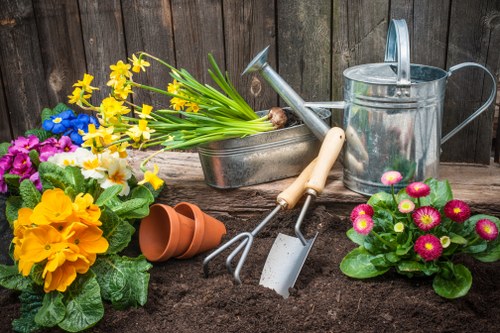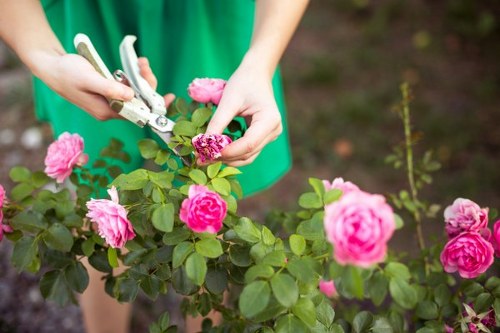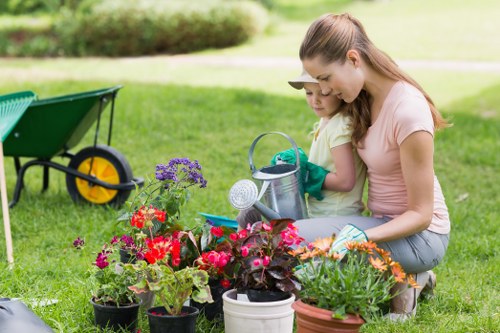Transform Your Outdoor Space: Landscape Gardening in Deptford

Landscape gardening in Deptford offers residents the opportunity to create stunning outdoor spaces that blend beauty, functionality, and sustainability. Whether you’re looking to redesign your garden, enhance your curb appeal, or establish a peaceful retreat, Deptford’s unique environment provides the perfect backdrop for a variety of landscaping projects.
The key to successful landscape gardening lies in understanding the local climate, soil conditions, and the specific needs of your plants. Deptford’s temperate climate allows for a diverse range of plant species, making it an ideal location for both beginners and experienced gardeners. By selecting the right plants and implementing thoughtful design principles, you can ensure that your garden thrives year-round.
One of the primary considerations in landscape gardening is the layout and design of your space. A well-designed garden not only enhances the aesthetic appeal of your property but also adds value to your home. Incorporating elements such as pathways, seating areas, and water features can transform your garden into a harmonious and inviting space.

Choosing the Right Plants for Deptford Gardens
Selecting the appropriate plants is crucial for the success of your landscape garden. In Deptford, you have access to a wide variety of native and adaptable plant species that can withstand the region’s climate conditions. Consider incorporating a mix of perennials, shrubs, and trees to create a layered and dynamic garden.
Perennials are a great choice for adding color and continuity to your garden. Plants like lavender, daylilies, and hostas require minimal maintenance and provide beautiful blooms throughout the growing season. Additionally, incorporating evergreen shrubs can add structure and year-round interest to your landscape.
Trees play a significant role in landscape gardening by providing shade, privacy, and aesthetic appeal. Choose trees that are well-suited to Deptford’s soil and climate, such as oak, maple, or magnolia. Planting trees strategically can also help reduce energy costs by providing natural insulation for your home.

Creating Sustainable Gardens
Sustainability is an important aspect of modern landscape gardening. By implementing eco-friendly practices, you can reduce your garden’s environmental impact and promote biodiversity. Consider using native plants, which require less water and are more resistant to local pests and diseases.
Incorporating a rainwater harvesting system can help conserve water and reduce your reliance on municipal sources. Additionally, using organic mulch can improve soil health, retain moisture, and suppress weeds, contributing to a more sustainable garden ecosystem.
Another sustainable practice is composting. Creating your own compost from kitchen scraps and garden waste not only reduces landfill waste but also provides rich nutrients for your plants. This closed-loop system helps maintain healthy soil and promotes vigorous plant growth.

Enhancing Your Garden with Hardscaping Elements
Hardscaping elements such as patios, walkways, and fences add structure and functionality to your landscape garden. These features not only enhance the visual appeal of your outdoor space but also provide practical areas for relaxation and entertainment.
- Patios: Create a comfortable outdoor living area with a well-designed patio. Choose materials that complement your garden’s aesthetic, such as natural stone, brick, or concrete pavers.
- Walkways: Pathways guide visitors through your garden and connect different areas. Use gravel, stepping stones, or wood to create charming and functional walkways.
- Fences: Fencing provides privacy and defines the boundaries of your garden. Select materials and styles that align with your overall landscape design.
Incorporating lighting into your hardscaping design can extend the usability of your garden into the evening hours. Solar-powered lights, lanterns, and path lights not only enhance safety but also create a warm and inviting atmosphere.

Maintaining Your Landscape Garden
Regular maintenance is essential for keeping your landscape garden in Deptford looking vibrant and healthy. Establish a maintenance routine that includes watering, pruning, fertilizing, and weeding to ensure your plants thrive.
- Watering: Proper watering is crucial, especially during the hot summer months. Install an irrigation system or use drip hoses to deliver water directly to the plant roots.
- Pruning: Regular pruning helps maintain the shape and health of your plants. Remove dead or diseased branches and encourage new growth.
- Fertilizing: Provide your plants with the necessary nutrients by applying organic or synthetic fertilizers according to their specific needs.
- Weeding: Keep your garden tidy by removing weeds regularly. Weeds compete with your plants for nutrients and can quickly overtake an unmanaged garden.
Additionally, monitoring for pests and diseases is important to prevent larger issues. Use natural pest control methods whenever possible to maintain an eco-friendly garden.

Seasonal Considerations for Deptford Gardens
Understanding the seasonal changes in Deptford is key to successful landscape gardening. Each season presents unique opportunities and challenges that can impact your garden’s health and appearance.
Spring
Spring is a time of renewal and growth. Planting bulbs, annuals, and perennials can add vibrant colors to your garden. It’s also an ideal time to prepare your soil by adding compost and mulch.
Summer
Summer requires diligent watering and maintenance to keep your garden thriving during the hot months. Consider installing shade structures or choosing heat-tolerant plants to reduce stress on your garden.
Autumn
Autumn is perfect for planting trees and shrubs, as the cooler temperatures help them establish strong roots. It’s also a good time to clean up fallen leaves and prepare your garden for winter.
Winter
Winter provides an opportunity to plan and design your garden for the upcoming year. Protect sensitive plants from frost and use mulch to insulate the soil.

Incorporating Outdoor Living Spaces
Creating outdoor living spaces enhances the functionality of your landscape garden. These areas provide places to relax, entertain, and enjoy nature without leaving your property.
- Decks: A deck can serve as the foundation for outdoor furniture, grills, and other amenities, making it an ideal spot for gatherings.
- Gazebos: Gazebos offer sheltered spaces that can protect against the elements while providing a picturesque focal point in your garden.
- Fire Pits: Fire pits create a cozy atmosphere and extend the usability of your garden into the cooler evenings.
When designing outdoor living spaces, consider the overall flow of your garden. Ensure that these areas are easily accessible and complement the natural features of your landscape.

Using Native Plants in Deptford Landscaping
Native plants are an excellent choice for landscape gardening in Deptford. They are well-adapted to the local climate and soil conditions, requiring less maintenance and resources compared to non-native species.
Benefits of Native Plants:
- Lower water and fertilizer needs
- Resistance to local pests and diseases
- Support for local wildlife and biodiversity
- Reduced maintenance and gardening costs
Incorporating native plants into your garden not only enhances its beauty but also contributes to the ecological health of the area. Some popular native plants for Deptford gardens include coneflowers, black-eyed Susans, and ornamental grasses.

Planning Your Landscape Garden
Effective planning is the foundation of a successful landscape garden. Start by assessing your outdoor space, considering factors such as sunlight, soil quality, and existing structures.
Create a detailed plan that outlines the layout, plant selection, and hardscaping elements. Use graph paper or landscape design software to visualize your ideas and make adjustments as needed.
Consider the size and scale of your garden to ensure that your design is both functional and aesthetically pleasing. Incorporate elements that reflect your personal style while also harmonizing with the natural surroundings.

Hiring Professional Landscape Gardeners in Deptford
While DIY gardening can be rewarding, hiring professional landscape gardeners in Deptford can ensure that your garden is designed and maintained to the highest standards. Professionals bring expertise, experience, and a keen eye for detail that can transform your vision into reality.
When selecting a landscape gardener, consider their portfolio, references, and knowledge of local plants and conditions. A reputable gardener will work with you to understand your goals and create a customized plan that meets your needs.
Investing in professional services can save you time and effort, allowing you to enjoy a beautiful and well-maintained garden without the stress of managing it yourself.

Budgeting for Your Landscape Project
Setting a realistic budget is essential for any landscape gardening project. Begin by determining how much you’re willing to invest in the design, materials, and maintenance of your garden.
Break down your budget into categories, such as plant selection, hardscaping, irrigation systems, and professional services. This approach helps you allocate funds appropriately and avoid unexpected expenses.
Consider ways to maximize your budget by prioritizing essential elements and exploring cost-effective solutions. For example, using native plants and DIY hardscaping projects can reduce overall costs while still achieving a stunning result.

Seasonal Maintenance Tips
Maintaining your landscape garden throughout the year requires seasonal attention to keep your plants healthy and your garden looking its best.
- Spring: Begin by cleaning up any winter debris, prune dead branches, and fertilize your plants to encourage new growth.
- Summer: Focus on regular watering, weeding, and monitoring for pests. Provide adequate shade and ventilation for your plants.
- Autumn: Plant bulbs for spring blooms, rake fallen leaves, and prepare your garden for the cooler months.
- Winter: Protect sensitive plants from frost, apply mulch to insulate the soil, and plan your garden design for the next year.
Adhering to these maintenance tips ensures that your landscape garden remains healthy and vibrant throughout all seasons.

Incorporating Water Features
Water features such as ponds, fountains, and waterfalls add a soothing element to your landscape garden. The sound of running water can create a tranquil atmosphere, enhancing the overall serenity of your outdoor space.
When integrating water features, consider the size and scale of your garden. Smaller spaces may benefit from compact fountains or birdbaths, while larger gardens can accommodate ponds or elaborate waterfalls.
Additionally, water features can attract wildlife, such as birds and butterflies, adding to the biodiversity of your garden. Ensure that any water feature you install is maintained regularly to prevent issues like algae growth and mosquito breeding.

Lighting Your Landscape Garden
Outdoor lighting plays a crucial role in enhancing the beauty and safety of your landscape garden. Proper lighting highlights key features, creates ambiance, and ensures that your garden is usable during the evening hours.
There are various types of outdoor lighting to consider:
- Path Lights: Illuminate walkways and pathways, making them safe and easy to navigate at night.
- Spotlights: Highlight specific features such as trees, sculptures, or water features.
- String Lights: Add a festive and cozy touch to outdoor seating areas and patios.
When designing your lighting plan, use energy-efficient options like LED lights or solar-powered fixtures to reduce energy consumption and environmental impact.

Seasonal Planting Strategies
Adopting seasonal planting strategies can help you maintain a dynamic and ever-changing landscape garden. By selecting plants that thrive in specific seasons, you can ensure that your garden remains colorful and vibrant throughout the year.
In the spring, focus on planting flowering bulbs and early bloomers to kickstart the growing season. Summer is ideal for establishing hardy perennials and heat-tolerant plants. In the autumn, incorporate plants that provide stunning fall foliage and prepare your garden for the winter months.
Additionally, consider succession planting to ensure continuous blooms and harvests. This technique involves planting different varieties at intervals, allowing for staggered growth and extended blooming periods.

Creating Wildlife-Friendly Gardens
A wildlife-friendly garden supports local fauna and promotes biodiversity. By providing habitat, food sources, and water, you can attract a variety of wildlife to your landscape garden.
- Bird Habitat: Install bird feeders, birdhouses, and water sources to attract different bird species. Planting native trees and shrubs also provides natural nesting sites.
- Pollinator Gardens: Bees, butterflies, and other pollinators play a vital role in ecosystem health. Planting nectar-rich flowers like lavender, sunflowers, and coneflowers supports these important creatures.
- Beneficial Insects: Encourage beneficial insects such as ladybugs and praying mantises, which help control pests naturally.
By creating a wildlife-friendly garden, you contribute to the environmental health of Deptford while enjoying the beauty and activity that wildlife brings to your outdoor space.

Using Mulch Effectively
Mulching is a fundamental practice in landscape gardening that offers numerous benefits. Applying mulch to your garden beds helps retain soil moisture, regulate temperature, and suppress weed growth.
Types of Mulch:
- Organic Mulch: Materials like wood chips, bark, straw, and compost enrich the soil as they decompose, improving its structure and fertility.
- Inorganic Mulch: Options such as gravel, stones, and rubber mulch provide long-lasting coverage without adding nutrients to the soil.
When applying mulch, ensure it is spread evenly to a depth of 2-3 inches around your plants. Avoid piling mulch against the stems or trunks of plants, as this can lead to rot and other issues.
Regularly replenish organic mulch to maintain its effectiveness and contribute to the ongoing health of your garden soil.

Implementing Vertical Gardening
Vertical gardening is an innovative approach that maximizes space and adds visual interest to your landscape garden. By growing plants vertically, you can create lush, green walls, trellises, and living fences that enhance the overall design of your outdoor space.
Benefits of Vertical Gardening:
- Optimizes limited space
- Improves air quality
- Provides privacy and shade
- Adds texture and dimension to your garden
Popular plants for vertical gardens include climbing roses, ivy, and succulents. Incorporate structures like trellises, pergolas, or hanging planters to support and showcase your vertical plantings.

Integrating Art and Decor
Artistic elements and decor can personalize your landscape garden and reflect your individual style. Incorporate sculptures, garden stakes, ceramic pots, and decorative stones to add character and charm to your outdoor space.
Ideas for Garden Art:
- Garden Sculptures: Place sculptures strategically to serve as focal points or complement existing features.
- Decorative Planters: Use colorful pots and containers to add visual interest and showcase your favorite plants.
- Stepping Stones: Personalize pathways with engraved or painted stepping stones for a unique touch.
When integrating art and decor, ensure that the elements harmonize with the overall design and theme of your garden. Choose pieces that enhance the beauty and functionality of your landscape.

Seasonal Color Schemes
Using seasonal color schemes can create a vibrant and dynamic landscape garden. By selecting plants that bloom in different colors during various seasons, you can maintain a visually appealing garden throughout the year.
- Spring: Opt for pastel hues with tulips, daffodils, and cherry blossoms.
- Summer: Embrace bold colors with sunflowers, marigolds, and petunias.
- Autumn: Choose warm tones with chrysanthemums, asters, and ornamental grasses.
- Winter: Incorporate evergreens and plants with colorful bark or berries for visual interest.
Coordinating your plantings to follow seasonal color patterns ensures that your landscape garden remains lively and attractive throughout the year.

Enhancing Privacy in Your Garden
Privacy is an important aspect of landscape gardening, especially for those who want to enjoy their outdoor space without disturbances. Creating private areas in your garden can be achieved through strategic planting, the use of structures, and thoughtful design.
Methods to Enhance Privacy:
- Hedges and Screens: Plant tall, dense hedges like privet, boxwood, or arborvitae to create natural barriers.
- Trellises: Install trellises with climbing plants to block views while adding greenery.
- Fencing: Use solid fences or add decorative panels to existing fences for increased privacy.
Incorporating privacy-enhancing elements allows you to create secluded spots for relaxation and enjoyment within your landscape garden.

Incorporating Edible Plants
Growing edible plants in your landscape garden combines beauty with functionality. Incorporating vegetables, herbs, and fruit-bearing plants not only provides fresh produce but also adds variety and interest to your garden.
- Vegetable Gardens: Plant a mix of seasonal vegetables like tomatoes, peppers, and lettuce for a productive garden space.
- Herb Gardens: Grow herbs such as basil, rosemary, and thyme for culinary use and their aromatic qualities.
- Fruit Trees: Incorporate fruit-bearing trees like apple, pear, or cherry to provide both shade and harvestable produce.
Integrating edible plants into your landscape garden promotes sustainability and allows you to enjoy the fruits of your labor while enhancing the overall beauty of your outdoor space.

Final Thoughts on Landscape Gardening in Deptford
Landscape gardening in Deptford is a rewarding endeavor that allows you to create a personalized and sustainable outdoor space. By carefully selecting plants, incorporating hardscaping elements, and maintaining your garden throughout the seasons, you can enjoy a beautiful and functional landscape year-round.
Whether you choose to embark on a DIY project or enlist the help of professional landscape gardeners, investing time and effort into your garden will yield lasting benefits. Embrace the unique opportunities that Deptford offers and transform your outdoor space into a haven of beauty and tranquility.
Ready to bring your landscape gardening vision to life? Contact us today to start designing the garden of your dreams.
